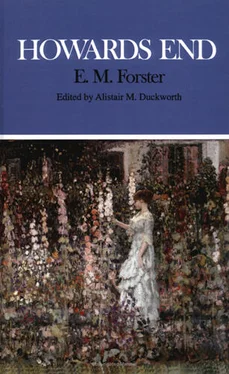Edward Morgan Forster - Howards End
Здесь есть возможность читать онлайн «Edward Morgan Forster - Howards End» весь текст электронной книги совершенно бесплатно (целиком полную версию без сокращений). В некоторых случаях можно слушать аудио, скачать через торрент в формате fb2 и присутствует краткое содержание. Жанр: Классическая проза, на английском языке. Описание произведения, (предисловие) а так же отзывы посетителей доступны на портале библиотеки ЛибКат.
- Название:Howards End
- Автор:
- Жанр:
- Год:неизвестен
- ISBN:нет данных
- Рейтинг книги:3 / 5. Голосов: 1
-
Избранное:Добавить в избранное
- Отзывы:
-
Ваша оценка:
- 60
- 1
- 2
- 3
- 4
- 5
Howards End: краткое содержание, описание и аннотация
Предлагаем к чтению аннотацию, описание, краткое содержание или предисловие (зависит от того, что написал сам автор книги «Howards End»). Если вы не нашли необходимую информацию о книге — напишите в комментариях, мы постараемся отыскать её.
Howards End — читать онлайн бесплатно полную книгу (весь текст) целиком
Ниже представлен текст книги, разбитый по страницам. Система сохранения места последней прочитанной страницы, позволяет с удобством читать онлайн бесплатно книгу «Howards End», без необходимости каждый раз заново искать на чём Вы остановились. Поставьте закладку, и сможете в любой момент перейти на страницу, на которой закончили чтение.
Интервал:
Закладка:
"You seem to think—" He looked at his watch. "Let me explain the point to you. It is like this. You seem to assume, when a business concern is conducting a delicate negotiation, it ought to keep the public informed stage by stage. The Porphyrion, according to you, was bound to say, 'I am trying all I can to get into the Tariff Ring. I am not sure that I shall succeed, but it is the only thing that will save me from insolvency, and I am trying.' My dear Helen—"
"Is that your point? A man who had little money has less—that's mine."
"I am grieved for your clerk. But it is all in the day's work. It's part of the battle of life."
"A man who had little money," she repeated, "has less, owing to us. Under these circumstances I do not consider 'the battle of life' a happy expression."
"Oh come, come!" he protested pleasantly. "You're not to blame. No one's to blame."
"Is no one to blame for anything?"
"I wouldn't say that, but you're taking it far too seriously. Who is this fellow?"
"We have told you about the fellow twice already," said Helen. "You have even met the fellow. He is very poor and his wife is an extravagant imbecile. He is capable of better things. We—we, the upper classes—thought we would help him from the height of our superior knowledge—and here's the result!"
He raised his finger. "Now, a word of advice."
"I require no more advice."
"A word of advice. Don't take up that sentimental attitude over the poor. See that she doesn't, Margaret. The poor are poor, and one's sorry for them, but there it is. As civilization moves forward, the shoe is bound to pinch in places, and it's absurd to pretend that anyone is responsible personally. Neither you, nor I, nor my informant, nor the man who informed him, nor the directors of the Porphyrion, are to blame for this clerk's loss of salary. It's just the shoe pinching—no one can help it; and it might easily have been worse."
Helen quivered with indignation.
"By all means subscribe to charities—subscribe to them largely—but don't get carried away by absurd schemes of Social Reform. I see a good deal behind the scenes, and you can take it from me that there is no Social Question—except for a few journalists who try to get a living out of the phrase. There are just rich and poor, as there always have been and always will be. Point me out a time when men have been equal—"
"I didn't say—"
"Point me out a time when desire for equality has made them happier. No, no. You can't. There always have been rich and poor. I'm no fatalist. Heaven forbid! But our civilization is moulded by great impersonal forces" (his voice grew complacent; it always did when he eliminated the personal), "and there always will be rich and poor. You can't deny it" (and now it was a respectful voice)—"and you can't deny that, in spite of all, the tendency of civilization has on the whole been upward."
"Owing to God, I suppose," flashed Helen.
He stared at her.
"You grab the dollars. God does the rest."
It was no good instructing the girl if she was going to talk about God in that neurotic modern way. Fraternal to the last, he left her for the quieter company of Mrs. Munt. He thought, "She rather reminds me of Dolly."
Helen looked out at the sea.
"Don't even discuss political economy with Henry," advised her sister. "It'll only end in a cry."
"But he must be one of those men who have reconciled science with religion," said Helen slowly. "I don't like those men. They are scientific themselves, and talk of the survival of the fittest, and cut down the salaries of their clerks, and stunt the independence of all who may menace their comfort, but yet they believe that somehow good—and it is always that sloppy 'somehow'—will be the outcome, and that in some mystical way the Mr. Basts of the future will benefit because the Mr. Basts of today are in pain."
"He is such a man in theory. But oh, Helen, in theory!"
"But oh, Meg, what a theory!"
"Why should you put things so bitterly, dearie?"
"Because I'm an old maid," said Helen, biting her lip. "I can't think why I go on like this myself." She shook off her sister's hand and went into the house. Margaret, distressed at the day's beginning, followed the Bournemouth steamer with her eyes. She saw that Helen's nerves were exasperated by the unlucky Bast business beyond the bounds of politeness. There might at any minute be a real explosion, which even Henry would notice. Henry must be removed.
"Margaret!" her aunt called. "Magsy! It isn't true, surely, what Mr. Wilcox says, that you want to go away early next week?"
"Not 'want,'" was Margaret's prompt reply; "but there is so much to be settled, and I do want to see the Charles'."
"But going away without taking the Weymouth trip, or even the Lulworth?" said Mrs. Munt, coming nearer. "Without going once more up Nine Barrows Down?"
"I'm afraid so."
Mr. Wilcox rejoined her with, "Good! I did the breaking of the ice."
A wave of tenderness came over her. She put a hand on either shoulder, and looked deeply into the black, bright eyes. What was behind their competent stare? She knew, but was not disquieted.
Chapter 23
Margaret had no intention of letting things slide, and the evening before she left Swanage she gave her sister a thorough scolding. She censured her, not for disapproving of the engagement, but for throwing over her disapproval a veil of mystery. Helen was equally frank. "Yes," she said, with the air of one looking inwards, "there is a mystery. I can't help it. It's not my fault. It's the way life has been made." Helen in those days was over-interested in the subconscious self. She exaggerated the Punch and Judy aspect of life, and spoke of mankind as puppets, whom an invisible showman twitches into love and war. Margaret pointed out that if she dwelt on this she, too, would eliminate the personal. Helen was silent for a minute, and then burst into a queer speech, which cleared the air. "Go on and marry him. I think you're splendid; and if anyone can pull it off, you will." Margaret denied that there was anything to "pull off," but she continued: "Yes, there is, and I wasn't up to it with Paul. I can only do what's easy. I can only entice and be enticed. I can't, and won't attempt difficult relations. If I marry, it will either be a man who's strong enough to boss me or whom I'm strong enough to boss. So I shan't ever marry, for there aren't such men. And Heaven help any one whom I do marry, for I shall certainly run away from him before you can say 'Jack Robinson.' There! Because I'm uneducated. But you, you're different; you're a heroine."
"Oh, Helen! Am I? Will it be as dreadful for poor Henry as all that?"
"You mean to keep proportion, and that's heroic, it's Greek, and I don't see why it shouldn't succeed with you. Go on and fight with him and help him. Don't ask me for help, or even for sympathy. Henceforward I'm going my own way. I mean to be thorough, because thoroughness is easy. I mean to dislike your husband, and to tell him so. I mean to make no concessions to Tibby. If Tibby wants to live with me, he must lump me. I mean to love you more than ever. Yes, I do. You and I have built up something real, because it is purely spiritual. There's no veil of mystery over us. Unreality and mystery begin as soon as one touches the body. The popular view is, as usual, exactly the wrong one. Our bothers are over tangible things—money, husbands, house-hunting. But Heaven will work of itself."
Margaret was grateful for this expression of affection, and answered, "Perhaps." All vistas close in the unseen—no one doubts it—but Helen closed them rather too quickly for her taste. At every turn of speech one was confronted with reality and the absolute. Perhaps Margaret grew too old for metaphysics, perhaps Henry was weaning her from them, but she felt that there was something a little unbalanced in the mind that so readily shreds the visible. The business man who assumes that this life is everything, and the mystic who asserts that it is nothing, fail, on this side and on that, to hit the truth. "Yes, I see, dear; it's about halfway between," Aunt Juley had hazarded in earlier years. No; truth, being alive, was not halfway between anything. It was only to be found by continuous excursions into either realm, and though proportion is the final secret, to espouse it at the outset is to insure sterility.
Читать дальшеИнтервал:
Закладка:
Похожие книги на «Howards End»
Представляем Вашему вниманию похожие книги на «Howards End» списком для выбора. Мы отобрали схожую по названию и смыслу литературу в надежде предоставить читателям больше вариантов отыскать новые, интересные, ещё непрочитанные произведения.
Обсуждение, отзывы о книге «Howards End» и просто собственные мнения читателей. Оставьте ваши комментарии, напишите, что Вы думаете о произведении, его смысле или главных героях. Укажите что конкретно понравилось, а что нет, и почему Вы так считаете.












